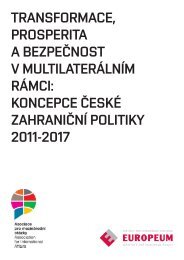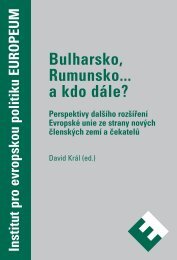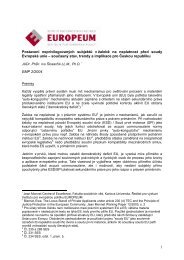eu constitutionalisation - EUROPEUM Institute for European Policy
eu constitutionalisation - EUROPEUM Institute for European Policy
eu constitutionalisation - EUROPEUM Institute for European Policy
You also want an ePaper? Increase the reach of your titles
YUMPU automatically turns print PDFs into web optimized ePapers that Google loves.
the greater the need <strong>for</strong> an international regime to facilitate agreement. Theregime also allows members to calculate more accurately the cost of a givenaction and allows them to increase their knowledge of the preferences ofother states. It allows issue linkage to occur more efficiently – members ofthe regime have fuller in<strong>for</strong>mation about how each state perceives issues onthe bargaining table. Thus, compromise will be reached more easily. Overall,regimes lower the transaction costs of bargaining and increase trust betweenstates to allow them reach ‘pareto optimal’ outcomes. Regimes also punishmembers who break a promise, or do not co-operate, by ostracising them.In a regime where conditions of complex interdependence exist, the lesspowerful actor in a bargaining relationship can be surprisingly successful inachieving its aims. In the case of the USA-Canadian relationship, it was foundthat less powerful states achieve their aims because of sensitivity interdependence.⁷Sensitivity interdependence implies that more powerful states maybe very sensitive to key decisions made by less powerful states, giving lesspowerful states bargaining leverage. Less powerful states may adopt a morecoherent and intensive lobbying strategy as regards a powerful state. Also, ifan international regime provides rewards based on non-zero-sum outcomes<strong>for</strong> all members, more powerful states will not want to depart from its cooperativenorms and will not coerce less powerful states.⁸ Overall, accordingto proponents of institutionalism, policy outcomes are explained bya bargaining process that af<strong>for</strong>ds relatively equal status to all its members.Moreover, rational institutionalists argue that perceptions of self-interestand of how objectives should be pursued depend not merely on nationalinterests and the distribution of world power, but on the quantity, qualityand distribution of in<strong>for</strong>mation’.⁹. The ability to assimilate new in<strong>for</strong>mationand to reach new understandings of causal relationships, that is the abilityto learn, is a key factor in influencing the bargaining relationship betweenstates and increasing their chances of co-operation.According to this view, membership of the EU itself will promote a cooperativebargaining relationship empowering less influential states. Thepresidency of the <strong>European</strong> Council will provide an important in<strong>for</strong>mationresource to facilitate smoother and more co-operative bargaining. Policies7) KEOHANE and NYE, (1977), op. cit8) Ibid.9) KEOHANE (1984), p. 245.Chapter 3: The 2004 IGC: Bargaining or Learning?Chapter 3: The 2004 IGC: Bargaining or Learning?will reflect consensus between more powerful and less powerful actors.Overall, <strong>for</strong> institutionalists, the incentives provided by a regime to engagein bargaining and compromise and the ability of a regime to enable a learningprocess are fundamental to achieving co-operation in international relations.The following hypotheses can be derived from the above discussion ofrational institutionalism:Hypothesis 1: The 2004 IGC reflected a bargaining process which allowed smallstates to achieve their strongest preference.Hypothesis 2: The Dublin IGC provides evidence of joint-problem solving andconceptualisation: non-zero sum process.Bargaining in Neo-RealismIn contrast to the institutionalist belief in rational actors’ ability to cooperateif they have fuller in<strong>for</strong>mation about each other’s preferences, theemphasis of neo-realists is on the insecurity of states and the need of statesto provide their own security ‘because no-one else will’.¹⁰ Anarchy in theinternational system implies that inequality of power is the only way ofproviding security and this ‘focus on power politics provides the apparentcontinuity in the realist tradition’.¹¹For neo-realists, ‘international society may be an arena of rules and institutions,but…is it really power and interests doing the work?¹² In refutingthe institutionalist account of international relations, the main criticism isthat ‘institutions are basically a reflection of the distribution of power inthe world. They are based on the self-interested calculations of the greatpowers, and they have no independent effect on state behaviour’.¹³Overall, according to neo-realist critiques, international institutions are notthe underlying cause of co-operation. The regime itself reflects the will ofmore powerful states and its success reflects their dominance. Power is centralto the operation of regimes and thus, regimes are not necessarily fair.¹⁴Relative gains matter most to members – if another country is benefiting10) WALT (2002), p. 20011) BUZAN (1996), p. 2212) DUNNE (2001), p. 22413) MEARSHEIMER quoted in KREBS (1999), p. 34614) WALT, op. cit, p. 21478 79








